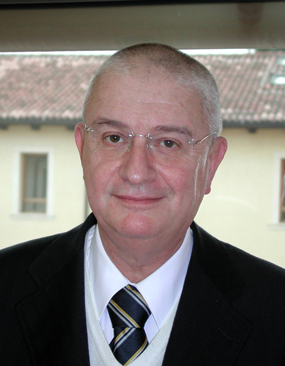Studying at the University of Verona
Here you can find information on the organisational aspects of the Programme, lecture timetables, learning activities and useful contact details for your time at the University, from enrolment to graduation.
Academic calendar
The academic calendar shows the deadlines and scheduled events that are relevant to students, teaching and technical-administrative staff of the University. Public holidays and University closures are also indicated. The academic year normally begins on 1 October each year and ends on 30 September of the following year.
Course calendar
The Academic Calendar sets out the degree programme lecture and exam timetables, as well as the relevant university closure dates..
| Period | From | To |
|---|---|---|
| 1° periodo di lezioni | Oct 1, 2015 | Dec 16, 2015 |
| Periodo riservato ad eventuali recuperi di lezioni - dicembre 2015 | Dec 17, 2015 | Dec 18, 2015 |
| 2° Periodo di lezioni - febbraio/marzo 2016 | Feb 10, 2016 | Mar 21, 2016 |
| 2° Periodo di lezioni - aprile/maggio 2016 | Apr 4, 2016 | May 7, 2016 |
| Periodo riservato ad eventuali recuperi di lezioni - maggio 2016 | May 9, 2016 | May 10, 2016 |
| Session | From | To |
|---|---|---|
| Sessione straordinaria 15/16 - studenti f.c. - dicembre 2015 | Dec 19, 2015 | Dec 23, 2015 |
| 1° appello - Sessione invernale 15/16 | Jan 8, 2016 | Jan 18, 2016 |
| 2° appello - Sessione invernale 15/16 | Jan 29, 2016 | Feb 8, 2016 |
| Sessione straordinaria 15/16 - studenti f.c. - marzo 2016 | Mar 22, 2016 | Mar 24, 2016 |
| 1° appello - Sessione estiva 15/16 | May 12, 2016 | May 23, 2016 |
| 2° appello - Sessione estiva 15/16 | Jun 9, 2016 | Jun 18, 2016 |
| 3° appello - Sessione estiva 15/16 | Jul 7, 2016 | Jul 16, 2016 |
| 1° appello - Sessione autunnale 15/16 | Aug 29, 2016 | Sep 7, 2016 |
| 2° appello - Sessione autunnale 15/16 | Sep 22, 2016 | Oct 1, 2016 |
| Session | From | To |
|---|---|---|
| Termine presentazione tesi di laurea - ottobre 2015 | Sep 25, 2015 | Sep 25, 2015 |
| Sessione autunnale 14/15 | Oct 22, 2015 | Oct 23, 2015 |
| Termine presentazione tesi di laurea - febbraio 2016 | Jan 11, 2016 | Jan 11, 2016 |
| Sessione invernale 14/15 | Feb 9, 2016 | Feb 9, 2016 |
| Termine presentazione tesi di laurea - marzo 2016 | Feb 29, 2016 | Feb 29, 2016 |
| Sessione invernale - marzo 2016 | Mar 30, 2016 | Apr 1, 2016 |
| Termine presentazione tesi di laurea - luglio 2016 | Jun 13, 2016 | Jun 13, 2016 |
| Sessione estiva 15/16 | Jul 4, 2016 | Jul 5, 2016 |
| Period | From | To |
|---|---|---|
| Festa di Ognissanti | Nov 1, 2015 | Nov 1, 2015 |
| FESTA DELL'IMMACOLATA | Dec 8, 2015 | Dec 8, 2015 |
| Vacanze di Natale | Dec 24, 2015 | Jan 6, 2016 |
| Vacanze di Pasqua | Mar 25, 2016 | Mar 29, 2016 |
| Festa della Liberazione | Apr 25, 2016 | Apr 25, 2016 |
| Festa dei Lavoratori | May 1, 2016 | May 1, 2016 |
| Festa del S. Patrono S. Zeno | May 21, 2016 | May 21, 2016 |
| Festa della Repubblica | Jun 2, 2016 | Jun 2, 2016 |
Exam calendar
Exam dates and rounds are managed by the relevant Law Teaching and Student Services Unit.
To view all the exam sessions available, please use the Exam dashboard on ESSE3.
If you forgot your login details or have problems logging in, please contact the relevant IT HelpDesk, or check the login details recovery web page.
Academic staff
 giovanni.alberti@univr.it
giovanni.alberti@univr.it
 roberto.flor@univr.it
roberto.flor@univr.it
 rita.maggi@univr.it
rita.maggi@univr.it
 martina.menon@univr.it
martina.menon@univr.it

Patrono Paolo
 paolo.patrono@univr.it
paolo.patrono@univr.it
 +39 045 8028813
+39 045 8028813
Strano Silvana
 silvana.stranoligato@univr.it
silvana.stranoligato@univr.it
 +39 045 8028856
+39 045 8028856
 claudio.tomazzoli@univr.it
claudio.tomazzoli@univr.it
 marcella.veronesi@univr.it
marcella.veronesi@univr.it
Study Plan
The Study Plan includes all modules, teaching and learning activities that each student will need to undertake during their time at the University.
Please select your Study Plan based on your enrollment year.
1° Year
| Modules | Credits | TAF | SSD |
|---|
Foreign language2° Year activated in the A.Y. 2016/2017
| Modules | Credits | TAF | SSD |
|---|
3° Year activated in the A.Y. 2017/2018
| Modules | Credits | TAF | SSD |
|---|
| Modules | Credits | TAF | SSD |
|---|
Foreign language| Modules | Credits | TAF | SSD |
|---|
| Modules | Credits | TAF | SSD |
|---|
Legend | Type of training activity (TTA)
TAF (Type of Educational Activity) All courses and activities are classified into different types of educational activities, indicated by a letter.
Trade Unions Law and Labour Law (2016/2017)
Teaching code
4S02531
Teacher
Coordinator
Credits
9
Language
Italian
Scientific Disciplinary Sector (SSD)
IUS/07 - LABOUR LAW
Period
2° periodo di lezioni - aprile/maggio 2017, 2° periodo di lezioni - febbraio/aprile 2017
Learning outcomes
The course aims at providing the necessary conceptual, normative and methodological bases for analysing and understanding the system of labour law and industrial relations. The purpose of the course is to make the student capable of assessing the issues arising in the implementation of the theoretical and regulatory framework, through correct reasoning and arguments.
Program
The labour law course aims at analysing labour law in a broad sense, trade unions law included, comparing public sector and private sector rules. The system of regulatory sources: historical development, in the EU and domestic legal systems. Pre-Constitutional and Post-Constitutional phases, impact of the EU sources. Particular attention is paid to the legal regulation of the individual employment contract and to the relationships between labour law and the market as well as to the so called “administration” of the labour relationship. The historical overview of the whole discipline, strike-related rules included, is followed by the analysis of the articulated system of sources of labour law, with particular regard to statutory law, so called collective autonomy sources, collective agreements and concertation systems between social partners. Particular attention is paid to the trade unions topic in the public sector.
Sources of Labour Law – Collective agreements – Concertation – Employment contract – Labour Market.
Examination Methods
For students not attending the exam is oral; for attending students, the oral examination is anticipated by a written test.
ERASMUS students are asked to to contact the professor Calafà (laura.calafa@univr.it) at the beginning of the course in order to agree with the teaching methods and assessment tests.
Teaching materials e documents
-
 PROGRAMMA E TESTI CONSIGLIATI
(octet-stream, it, 18 KB, 02/08/16)
PROGRAMMA E TESTI CONSIGLIATI
(octet-stream, it, 18 KB, 02/08/16)
Type D and Type F activities
Le attività che consentono l’acquisizione dei crediti riservati alle attività formative a libera scelta dello studente (TAF D) sono le seguenti:
• Un insegnamento previsto nell’elenco delle attività formative (TAF D) allegato al piano didattico del corso di laurea in Scienze dei servizi giuridici;
• Un insegnamento attivato nei Corsi di studi afferenti al Collegio di Giurisprudenza;
• Un laboratorio didattico attivato nei Corsi di studi afferenti al Collegio di Giurisprudenza;
• Un laboratorio didattico attivato nei Corsi di studi afferenti al Dipartimento di Scienze Giuridiche;
• Un insegnamento previsto dall’Offerta Formativa di Ateneo, non impartito nell’ambito dei corsi di studi afferenti al Collegio di Giurisprudenza: il riconoscimento dei crediti acquisiti sarà subordinato alla preventiva presentazione di coerenti programmi formativi valutati dalla Commissione istruttoria per la didattica e approvati dal Collegio didattico.
• Attività formative organizzate dai singoli docenti del Collegio di Giurisprudenza o del Dipartimento di Scienze Giuridiche: previa approvazione del Collegio ad esse verrà attribuito, dopo un’apposita verifica, un credito per ogni 6 ore di frequenza obbligatoria;
• Attività formative che implicano la partecipazione a convegni o seminari organizzati sotto il “logo” del Dipartimento di Scienze Giuridiche o dell’Ateneo: devono essere preventivamente approvate dal Collegio di Giurisprudenza indicando un docente di riferimento del Collegio di Giurisprudenza ovvero del Dipartimento di Scienze Giuridiche. Un credito per ogni giornata di convegno o di seminario si acquisisce dopo apposita verifica che dimostri l’avvenuta fruizione culturale del tema del convegno o del seminario.
Le attività che consentono l’acquisizione dei crediti riservati alle ulteriori attività formative (TAF F) sono le seguenti:
• Informatica (3 cfu)
• Stage;
• Un laboratorio didattico attivato nei Corsi di studi afferenti al Collegio di Giurisprudenza;
• Un laboratorio didattico attivato nei Corsi di studi afferenti al Dipartimento di Scienze Giuridiche.
Al link https://www.univr.it/it/i-nostri-servizi/segreterie-studenti/giurisprudenza#categdoc_7103 la modulistica per l'inserimento di attività non selezionabili in autonomia dallo studente in sede di compilazione del piano degli studi.
Modules not yet included
Career prospects
Module/Programme news
News for students
There you will find information, resources and services useful during your time at the University (Student’s exam record, your study plan on ESSE3, Distance Learning courses, university email account, office forms, administrative procedures, etc.). You can log into MyUnivr with your GIA login details: only in this way will you be able to receive notification of all the notices from your teachers and your secretariat via email and soon also via the Univr app.
Internships
Internships are aimed at enabling students to gain direct knowledge of the world of work and to acquire specific professional skills.
Internships are carried out under the responsibility of an individual lecturer, and can be carried out in professional firms, public administration bodies and companies recognised by the University of Verona.
Any CFU credits gained by doing internships will be recognised and recorded by the University in accordance with the relevant University regulations in force (Regolamento d’Ateneo per il riconoscimento dei crediti maturati negli stage universitari).
For further information on internships, please go to: https://www.univr.it/it/i-nostri-servizi/stage-e-tirocini.































